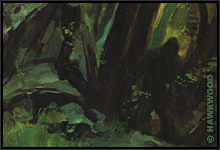Once I was asked by someone what I considered to be the opposite of a good Christian. The obvious answer would seem to be: a bad Christian, which could be taken to mean someone who might nominally consider themselves to hold Christian beliefs, but who paid mere lip service to their faith by (for example) attending church once a year for the annual Christmas service, or by praying to the Almighty to grant them victory in some sporting event. But there is another possible answer.
The opposite of a good Christian might be: a good Satanist. Satan fills the Biblical role of the adversary, famously tempting Jesus in the wilderness. Looking out over all the world from an [1]‘exceeding high mountain’, Satan offers to grant Jesus dominion over all that he sees if Jesus will only perform an act of worship to him. I wonder if you can spot the curious contradiction in this proposition of Satan's? It implies either that Satan already had the world as his dominion, and it was therefore his to give, or that Jesus presumably would have known that Satan was offering him something that Satan did not truly own, and therefore no real 'temptation' as such took place because nothing was actually on offer. In lawyer's terms, it all hinges on the question of prior ownership. But Jesus in his response gives no indication of his awareness of this. Rather, he points out only that Satan should serve and worship God.
This curious conversation which took place high above the world between these two ultimate adversaries must have been an apocryphal exchange anyway, because there were no other witnesses present to record what was being said at the time. As for Jesus’ admonishing Satan to serve and worship God: had Satan done so, then one senses that the whole balance of the universe and the order of reality would have shifted – and not necessarily in a good way. Satan’s mere existence indicates that he had a crucial function in the proceedings – and that he was self-aware enough to realize this function. As with the extremes of all opposing forces, each to some extent defines itself by its relationship to the other, which in itself is a form of mutual dependence. I can imagine Satan laconically answering Jesus with: ‘Well, that’s not going to happen..’, perhaps not so much because of his nature, but because of an awareness of his essential role in the scheme of things.
There is a further possibility: maybe after all, Satan actually did – and does – have the world in his pocket. And that being so, how would he choose to play things? It’s not hard to imagine that he would work in various devious ways to trick others into thinking that they were opposing him, when all along they were in reality carrying out his master plan for him. He would allow others to create texts both cruel and contradictory, which would include the ideas that [2]slaughter and [3]slavery were okay things to do, that if you were the [4]victim of rape then you must marry your rapist, that if your unruly son was disobedient, then you should drag him outside and [5]have him stoned to death.
The Satanic triumph would be, not to closet these extreme and inhuman behaviours away in some dark and forbidden heretical text, but to have them accepted as scripture, so that others would uncritically follow his plan, because it would then be termed ‘defending one's faith’. And (a masterstroke on his part) he would ensure that these texts could be interpreted in so many subtly different ways that they would cause deep divisions of [6]doctrine – deep enough actually to cause major schisms of faith that would last for centuries.
The Satanic triumph would be, not to closet these extreme and inhuman behaviours away in some dark and forbidden heretical text, but to have them accepted as scripture, so that others would uncritically follow his plan, because it would then be termed ‘defending one's faith’. And (a masterstroke on his part) he would ensure that these texts could be interpreted in so many subtly different ways that they would cause deep divisions of [6]doctrine – deep enough actually to cause major schisms of faith that would last for centuries.
Back on top that ‘exceeding high mountain’, maybe Jesus missed his chance. Maybe he should have called Satan’s bluff. Maybe he should have seen through the double blind. For that one brief moment in time, the world, literally and metaphorically, lay at his feet, and all might have taken a very different path. But Satan was Satan, and Jesus was Jesus, and their preordained roles were to resist each other.
Hawkwood
[1]Matthew 4:9.
[2]Book of Numbers 31:7-18. See also other instances throughout the Bible of murder and massacre too numerous to cite here.
[3]Exodus 21:6 and Deuteronomy 15:17. Also Leviticus 25:44-47, and also in the New Testament, such as in Ephesians 6:5 and Timothy 6:1.
[4]Deuteronomy 22:28-29.
[5]Deuteronomy 21:18-21.
[6]According to the World Christian Encyclopedia (Oxford University Press, 2nd edition, 2001), estimates of the different and distinct Christian denominations worldwide vary from 33,000 to 38,000.
Painting: The Temptation of Christ, by Vasily Surikov.
Painting: The Temptation of Christ, by Vasily Surikov.















































































No comments:
Post a Comment
You are welcome to share your thoughts.